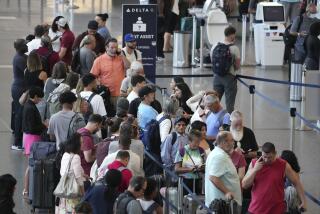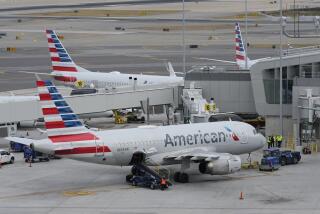American, Delta face a downdraft in profit
- Share via
Hiking airfares and adding fees bolstered revenue for two of the nation’s largest carriers, but high fuel costs continued to wipe away earnings for American Airlines and Delta Air Lines Inc.
Both carriers posted operating losses in the third quarter when oil prices remained high. Even with recent declines in the price of jet fuel, the airlines are bracing for a downturn in air travel that could keep them from making any profit.
“While fuel prices have fallen from record high levels a few months ago, the economic uncertainty, and what that might mean for travel demand, is a serious concern,” said Gerard Arpey, chief executive of American’s parent, AMR Corp.
But don’t expect less-crowded cabins or reduced fares any time soon.
Although some airlines are starting to reduce the so-called fuel surcharges -- which climbed to more than $400 for some international flights -- airlines plan to cut flights before slashing fares.
“I’m not enthusiastic about lowering ticket prices right now because oil is still at high levels,” Arpey said during a conference call with reporters Wednesday. “The industry is not earning any money, so we have to find a way to charge more for our product and cover our costs.”
In the July-September quarter, the Fort Worth-based airline posted a profit of $45 million, thanks mainly to a one-time gain of $432 million from the sale of its investment unit.
Excluding the gain, American had a loss of $360 million, most of it due to a $1.1-billion jump in the cost of fuel. The airline paid an average of $3.57 a gallon for jet fuel compared with $2.17 a gallon in the year-earlier period.
Sales climbed 8% as average fares rose more than 13%. The new fee American began charging passengers for their first piece of checked baggage generated $70 million in extra revenue.
With demand slowing a bit more than expected, the airline said it was cutting more flights than planned in the current quarter.
“With a weakening global economy, we have seen softening demand,” said Thomas Horton, American’s chief financial officer.
Still, the airline said it was making a substantial investment in its future and was ordering 42 wide-body jets from Boeing Co. with an option to buy 58 more.
The first delivery of the jets, Boeing 787 Dreamliners that the manufacturer promises will use 20% less fuel than other jets of similar size flying today, would not begin until four years from now. They would replace its aging fleet of Boeing 767 jets.
The airline declined to say how much it was paying for the planes. They are listed at about $200 million each, but large buyers such as American can typically buy planes at steep discounts.
High fuel costs also hit Atlanta-based Delta, which reported a larger-than-expected third-quarter loss. The nation’s third-largest carrier posted a loss of $50 million, compared with a profit of $220 million a year earlier. Revenue rose 9%.
Delta shares fell 9 cents, or 1.2%, to $7.44, while AMR’s shares slipped 1 cent to $8.78.
Delta, which expects to complete its merger with Northwest Airlines Corp. by the end of the year, said that despite the recent decline in fuel prices, a worsening economy could also keep the airline from posting a profit in the current quarter.
“While near-term demand remains solid, the current economic crisis creates uncertainty about the longer-term revenue outlook,” said Ed Bastian, Delta’s chief financial officer in a conference call with analysts Wednesday.
The airline, which has resisted following American in charging travelers for their first piece of checked luggage, said it would “continue to monitor” the possibility of imposing the fee on its passengers.
But so-called a la carte pricing, in which airlines charge for pillows, drinks and other services separately from the base fare, “is here to stay,” Bastian said. “Fee-based revenues are very important to the industry.”
--
More to Read
Inside the business of entertainment
The Wide Shot brings you news, analysis and insights on everything from streaming wars to production — and what it all means for the future.
You may occasionally receive promotional content from the Los Angeles Times.










